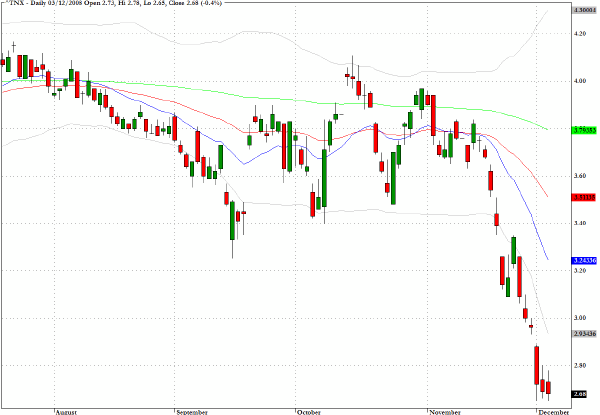| Corcoran Technical Trading Patterns For December 4 |
| By Clive Corcoran |
Published
12/4/2008
|
Stocks
|
Unrated
|
|
|
|
Corcoran Technical Trading Patterns For December 4
This is an abbreviated column today as the markets appear to me to be in a peculiar state of anticipation for several important developments which will become clearer with important news from European central banks and the release of the employment data tomorrow.
Here is a contribution that I have made to another publication and which expresses a concern about the current flight to safety in the US Treasury Market.
For Sovereign credit investors could it be different this time?
Bill Gross of PIMCO has suggested that we may be facing a new economic environment where the ground rules have changed sufficiently that previous benchmarks for applying valuations for equities no longer apply. In other words, don’t count on a new bull market in stocks any time soon.
“Stocks are cheap when valued within the context of a financed-based economy once dominated by leverage, cheap financing and even lower corporate tax rates,” Pacific Investment Management Co.’s Gross wrote in a market commentary posted on the company’s Web site. “That world, however, is in our past not our future.”
It has proven to be hazardous to embrace the notion that this time it will be different. Usually this argument is used to support bubbles that have developed and which are ultimately unsustainable, but which can be kept inflated for one last expansionary phase by the suggestion that a paradigm shift has taken place, and that underlying market conditions are so transformed that previously held grounds for investor caution can be cast aside.
A classic recent example of this was the notion that dot com companies in the late 90’s were examples of a New Economy in which new metrics were relied upon, rather than stuffy notions like revenue and earnings, to prop up the massive bubble that allowed companies with zero sales to command billion dollar market capitalizations.
Even more insidious was the suggestion that one of the alleged bonuses of financially engineered securities was that risk had been distributed more widely and that the incentives/premium that should be required to reward investors in a broad range of asset backed securities could be re-priced downwards. The fallacy of this bogus argument is now widely recognized and is in large part what has created the current financial crisis.
Returning to Bill Gross’s comments, he probably is right to conclude that it is becoming harder with each new bailout and government moving of the goal posts of the market mechanisms that still remain, to champion a full-blown revival case for equities. To assume that it is just a matter of time before a renewed bull market vigor will return to inspire asset allocators to commit funds on the long side to the stock market and that this will enable previously successful business models, in financial services for example, to flourish again, seems like wild-eyed optimism.
I would suggest that Mr Gross should also be concerned that the ground rules are also being dramatically changed in that part of the capital markets that he is most focused upon; it could be different for government debt investors this time as we are moving into uncharted territory.
How can we be sure that sovereign debt will continue to be supported in the international capital markets?
The US government has the benefit that the dollar is still the world’s reserve currency but the amount of Treasury paper that has to be digested by the markets in the coming years is staggering. Even if international investors, pension funds and insurance companies continue to support the US Treasury market, which is not a given, the fact that so many other sovereign credits will be competing for the world’s limited savings suggests that there just could be a major casualty along the way. Just to focus on the UK for one moment, total public debt is expected to more than double in the next three years and this will require the issuance of hundreds of billions of pounds of new gilts. Sterling is already exploring new lows against major currencies, and the credit default swap market shows that the credit rating of the UK government is falling off rapidly.
If savers were to begin to doubt that the full faith and credit of a sovereign borrower can be totally relied upon, as is now being hinted at by the increasing insurance rates in credit default swaps, then the sovereign debt edifice that Mr Gross and other risk averse asset allocators are currently supporting could prove to be yet another house of cards.

Clive Corcoran is the publisher of TradeWithForm.com, which provides daily analysis and commentary on the US stock market. He specializes in market neutral investing and and is currently working on a book about the benefits of trading with long/short strategies, which is scheduled for publication later this year.
Disclaimer
The purpose of this article is to offer you the chance to review the trading methodology, risk reduction strategies and portfolio construction techniques described at tradewithform.com. There is no guarantee that the trading strategies advocated will be profitable. Moreover, there is a risk that following these strategies will lead to loss of capital. Past results are no guarantee of future results. Trading stocks and CFD's can yield large rewards, but also has large potential risks. Trading with leverage can be especially risky. You should be fully aware of the risks of trading in the capital markets. You are strongly advised not to trade with capital.
|